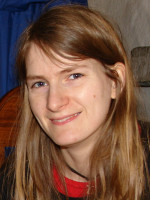Climate Change
Natural Catastrophes
Post-Doctoral Fellowships
Sweden
Could a Climate Change/Earthquake Link Mean Unexpected Tsunamis?
Through a combination of techniques from the geosciences and computer modeling, Dr. Steffen aims to quantify the increased seismic hazard that could be created by Greenland’s melting ice. No existing model is sophisticated enough to handle this goal. So, building on her previous work, she will develop a new model capable of mapping out the subsurface forces at work in Greenland, in high-resolution and in three-dimensions. By creating such a tool, capable of representing realistic fault slip behavior, she will be able to identify areas of Greenland that may have experienced powerful earthquakes in the past as a result of lost ice mass, as well as areas that could be at risk today as the melting continues or even accelerates. If she finds that any faults off Greenland’s coast, beneath the ocean, are unstable, she will also assess the potential for tsunamis and the risk they would pose for the coasts of Europe and North America.
Because many regions previously covered in glaciers are stable, continental zones, only small or moderate earthquakes are typically expected there. If ice loss is capable of generating magnitude-8 quakes, however, it would mean the risk for Greenland has been significantly underestimated. Knowledge of this hazard will be important for industry players currently increasing offshore oil production and mineral extraction in the country with all the requisite infrastructure. The effects of a major earthquake plus tsunami would be felt by many more. Ice sheets around the world are currently melting and sea-level rise is clearly not the only reason to be concerned. Fortunately, Dr. Steffen’s model will be applicable to other regions, like Antarctica, making it possible to assess links between seismic activity there and the potential for unexpected tsunamis in South America, Southern Asia and Australia. Her work investigating the connections between climate change and powerful movements of the earth and oceans could aid in the prevention of coastal risks and the development of tsunami warning systems where today there are none.
Scientific title: Glacially Induced Earthquakes In Greenland
To add or modify information on this page, please contact us at the following address: community.research@axa.com

Rebekka
STEFFEN
Institution
Uppsala University
Country
Sweden
Nationality
German
Related articles
Climate Change
Food & Nutrition
AXA Chair
Argentina
Harnessing the Potential of RNA: Pioneering a Sustainable Path to Climate-Resilient Crops
Federico Ariel's research project addresses this critical threat to global agricultural productivity and offers a potential solution. His focus on... Read more

Federico
ARIEL
National University of the Litoral (UNL)
Natural Catastrophes
Joint Research Initiative
Spain
Understanding Wildfire Risk: A Local-Scale Assessment Framework in Chile
Wildfire is a major hazard across the globe, causing extensive economic, ecological and health impacts. While wildfires are common throughout... Read more

Marcos
RODRIGUES MIMBRERO
.thumbnail.jpg)